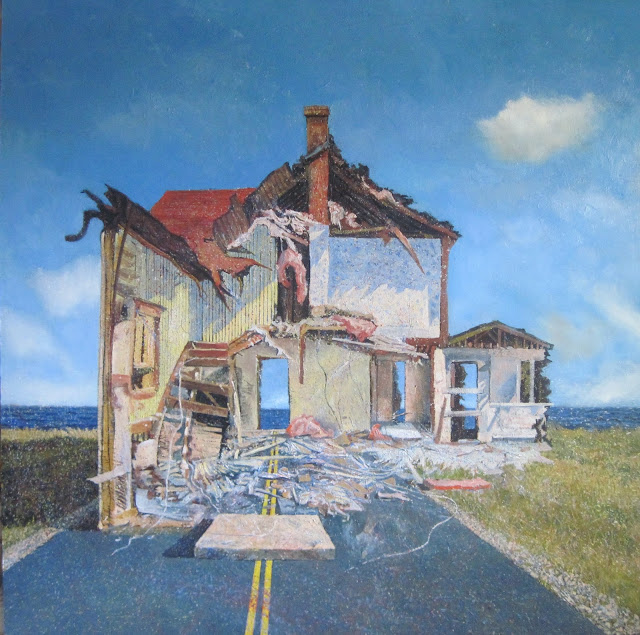House of Film; The McNeil House For Wayward Youth
 |
| House of Film, The McNeil House For Wayward Youth, Chester, NS, oil on board, 48" x 48", Steven Rhude |
A quick search of Chester, Nova Scotia reveals an image of sailing, cocktails on a veranda overlooking the harbour, and money - lots of it - piles of it in fact. Sir Christopher Ondaatje resides there during the summer and refers to it this way: "A lot of people know about Chester, N.S., but nobody talks about it. They simply don’t want anyone else to go there."
Concurrently, a general view in Wikipedia describes the village thus: "Chester is one of the wealthiest communities in the province as a result of being a holiday and resort destination, with many seasonal and year-round estates and mansions. The nearby waters of Mahone Bay and its numerous islands are well known for yachting and have made the Chester Yacht Club into a cruising destination."
Apparently, I see a different place. Since the film tax credit disaster and the exodus of artists and industry workers to greener pastures like Hamilton or Sudbury, I've never passed through Chester and been comfortable with the prevailing version etched into the Doers and Dreamers vacationers bible. Yet it just so happens Ondaajie's view may be more prescient than he thought possible - but not for the obvious reasons of wealth, and seclusion. Ninety nine percent of us hardly meet that criteria, and after all, we are told by our Premier that subsidies to business are a no-no, at least in the film sector. Therefore, we are encouraged to understand that Chester is the land of free range economics, self made men and women, and ... oh ya... Clearwater Foods - where never a subsidy or forgivable loan could be found. Not what Ondaatje had in mind when he iterated: "They simply don’t want anyone else to go there."
Reality suggests otherwise, as I observed the subject of my painting noted above, being demolished on a street in Chester on a typically bright and cheerful Chester Sunday morning. Suddenly my image of Chester quickly changed to one of forlorn detachment, as the month of April 2016 turned into the cruelest month - a month where artists in the province pondered and railed against a concerted attack on their industry by a government oblivious to the nature of their own house, and its cultural purpose. Sorry Chester, 'I'm only passing through' is what I though at the time. But issues have a way of haunting you.
It may have started with a bunch of bean counters concluding our cultural house was redundant around the same time as the wrecking ball arrived to level this house, a house, my house, your house, our house, the house - but it revealed to me just how important it was not to take the house for granted.
Ironically, the real industry house employed to render the "provincial cultural and social landscape" in all its shapes and forms, and narratives, was under attack by that which it never imagined could be its enemy - the very person that claimed protection was needed from the invaders of market forces and demographic favouritism.We as artists are still trying to fathom how a Premier of a province like Nova Scotia could all of sudden not connect art and culture with a big priority like public education, but several interviews with McNeil back in April did just that. Education was a priority, and Film was a frivolous subsidy that no one supposedly mentioned to him as he toured the province.
Notwithstanding McNeil (he to will move on), or the boarded up buildings in Nova Scotia, houses are not temporary in the Nova Scotian mind. The mind doesn't move on so quickly as long as memory prevails. The mind of a house has too much social, regional, and spiritual depth to vaporise under the current circumstances. On the contrary, the need to provide a sense of permanence to those that choose to live here (especially in a climate where "going down the road" has become our provincial anthem played consistently by politicians come election day), some how finds a metaphor in every aspect of our architectural countenance - especially through the arts and the film industry that generates, and indeed, under the circumstances, highlights our uncomfortable plight. The truth hurts, but we need to confront it.
People will continue to talk about the film debacle, the bean counters, the job losses, out migraton, and missed opportunities. These issues never really go away. Yet, when shows like "Terroir" ( a survey of Nova Scotia Visual Art at the Art Gallery of Nova Scotia) bring our people together, it gets harder and harder for our provincial government to justify its handling of the film tax credit, even though some people don't want anyone else to go there.
Steven Rhude, Wolfville
http://www.stevenrhudefineart.com/


Fabulous comment! Fabulous painting! Ox
ReplyDelete